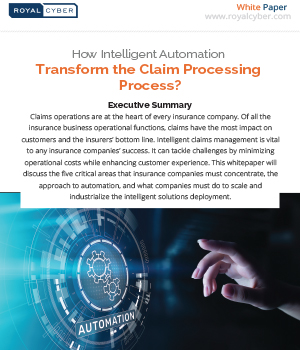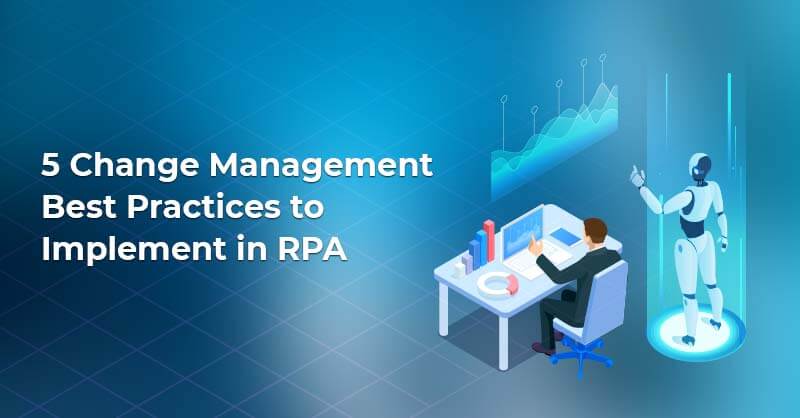Scaling Up RPA in Banking & Finance
Written by Neha Madiya
Technical Content Writer
Robotic Process Automation (RPA) has become a growing necessity for all commercial sectors, including banking and finance. This necessity is contributed by the fact that the banking industry faces much competition from Fintech and various other virtual banking solutions. The banking sector often relies on human judgment and procedural systems, which are error-prone. RPA aims to remove the possibility of errors in critical financial procedures by letting machines handle routine tasks and jobs efficiently and accurately. RPA works with the intelligence of the human workforce to lower costs and increase overall efficiency.
Enterprise-Wide Automation Using RPA
RPA is a strategic program that works better when a large-scale deployment is considered. It is essential to scale RPA so that the whole banking enterprise and financial institutions can benefit from the increased efficiency and accuracy. The following points describe the way through which enterprise-wide scaling of RPA systems is achievable.
The organization needs to understand that RPA, in its essence, is an enterprise platform and should begin planning, development, and deployment cycles, considering that mindset.
Understand the technical aspects of RPA programs and the requirements needed to be fulfilled to scale up such a system for an organization of your size.
Go beyond the financial aspects of RPA and reassure your employees that such systems are for assistance and not to take their jobs.
Speeding Up The Program
Process automation in banking is a game-changer. The organizations looking for saving and efficiency generation through the adoption of RPA can speed up their program considering the following:
Leverage Supervised Machine Learning - Technological advancement has increased efficiency and robustness in all factors related to business. While RPA works to automate routine tasks, ensure that speed is maintained throughout the work procedure by utilizing AI and ML-enabled document scanners.
Usability and Interoperable - RPA implementation can be further optimized if it is compatible with the organization's previously used systems that provide data and retrieve the robotic system's final output. It also needs to be designed so that Non-IT banking employees can configure and leverage these systems easily.
Robotic Process Automation can eliminate all of the manual work by introducing a bot that can perform tasks automatically. Here are some quick use cases that will help you craft your approach towards integrating RPA in the BFSI industry.
- Customer service and support
- Credit card processing
- Regulatory compliance
- Loan processing
- Claims settlement
- Payment's processing
- Underwriting
Hand-picked for you:
Role of RPA in Customer Loan Processing

Factors affecting the implementation process
Every process in an organization depends on three critical pillars. Let us analyze each of them concerning an RPA implementation program:
People:
Your team should consist of both IT and Management personnel to work in synergy to create the best system for your organization.
Process:
Creating a stepwise program covering all steps from initiation to deployment at an enterprise-wide scale should be taken into consideration so that no problems occur during the actual implementation.
Technology:
A fully automated process may need to leverage Machine learning, Artificial Intelligence, and data management in such a way that it maintains accuracy while increasing overall speed. Technologies like NLP and ML are also used to perform activities such as email triage, underwriting and risk analysis.
Chat bots can also be used to improve customer experience and get the back-office tasks done by an RPA bot that can deliver information and perform required actions during the chat session.
Control in Demand and Supply
The banking and financial sector is under tremendous pressure to implement RPAs to battle customer dissatisfaction and errors that occur due to human inconsistency from repetitive tasks. The implementers must devise a plan to strategically apply and scale through their procedures to battle such increasing demand. A way to do this is choosing the most technologically simple department first. After implementing automation through RPAs in that department and measuring success rates, we can move on to other areas of the organization and follow-through.
To perform feasibility analysis, take this FREE RPA Process Assessment that could help you find out the RPA suitability, error reduction rate, and ease of implementation in numbers, and it could make a big difference to your automation journey.
RPAs have come a long way from an experimental technology and have become necessary for many sectors that incorporate regular and repetitive jobs such as banking and finance. It is essential to plan and execute a program through which organizations can efficiently launch RPAs in their systems. If done correctly, an effective program can speed up and make your organization a lot more efficient. All it takes is a planned approach towards the automation process. With 90+ bots in production, 65+ certified professionals, and 85+ processes automated, Royal Cyber’s RPA solutions will scale your journey to digital transformation. Get in touch with RPA certified expert to know more.




